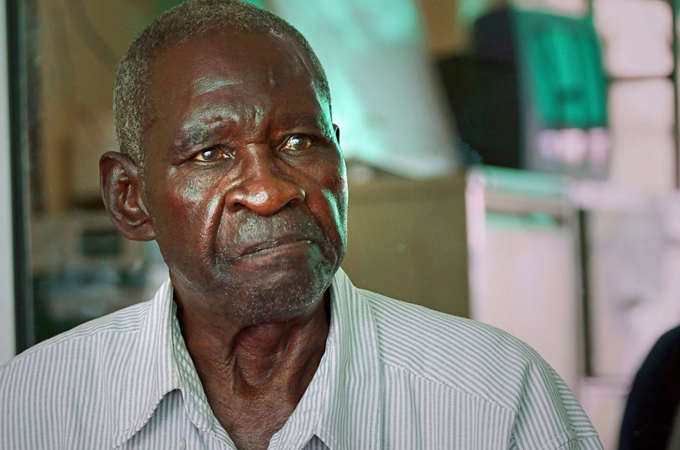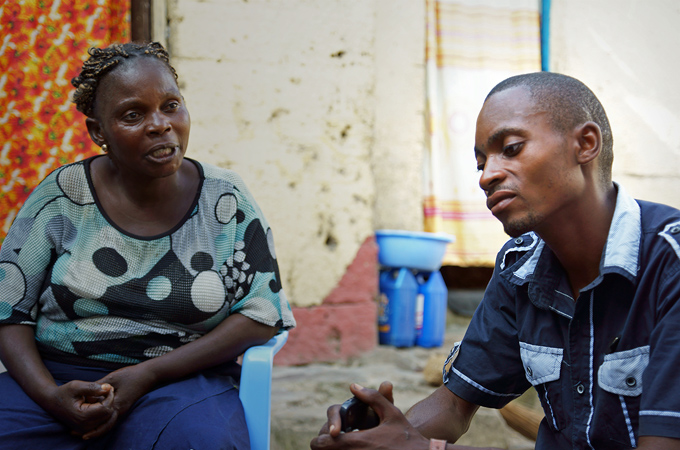Angolans in DRC have mixed feelings on home
Displaced by Angola’s brutal civil war, some ex-refugees now living in DR Congo still don’t want to return.

Kinshasa, Democratic Republic of Congo – Seventy-six-year-old Manuel Francis is aware of the irony of his predicament. As an immigration officer working on the border between the Democratic Republic of Congo (DRC) and Angola, he was forced to flee Angola in 1999, when the third phase of his country’s civil war broke out. Francis made his way to Kinshasa, the DRC’s capital, to escape the violence.
“I lost everything. A decent house, a good salary. My heart aches when I think about what happened,” said Francis, dressed immaculately in a pinstriped shirt and brown trousers in Kinshasa.
More than 150,000 Angolans made their way into the DRC during the course of the civil war, which began shortly after Angola gained its independence from Portugal in 1975. Some 450,000 others ended up in South Africa, Zambia, Namibia, the Republic of Congo and Botswana.
The civil war dragged on for 27 years, pitting the People’s Movement for the Liberation of Angola (MPLA), the National Union for the Total Independence of Angola (UNITA) and the National Liberation Front of Angola (FNLA) against each other in a bid to control the country. The conflict soon became another proxy battle in the Cold War, with the US backing the UNITA and the Soviet Union supporting the MPLA. South Africa and Cuba also played major roles.
Angola’s brutal civil war, which was funded in part by the country’s mineral wealth, at one stage involved one in three Angolan children fighting as child soldiers. The war is said to have resulted in the deaths of at least 500,000 people, and the displacement of a million people.
 |
| Manuel Francis said he lost everything after being forced to flee Angola [Sorin Furcoi/Al Jazeera] |
The humanitarian disaster became one of the United Nations Refugee Agency‘s (UNHCR) first emergency efforts to protect refugees outside of Europe since the agency’s formation in 1950.
Refugee status terminated
In 2012, as stability returned to Angola, the government of the DRC – like other countries in sub-Saharan Africa with sizable Angolan refugee populations – terminated the refugee status of Angolan refugees. The move was part of a plan to persuade the refugees to return home. For those ex-refugees who wanted to stay, the DRC government said it would make residency permits available.
Around 23,000 Angolans returned through the UNHCR-mediated repatriation programme in 2012. By January 2013, another 22,000 others said they were also prepared to return.
The UNHCR said the third wave of repatriations of Angolan refugees, due to start in mid-2014, is significant because it signals a possible conclusion to one of the continent‘s oldest stories of displacement.
But another 47,815 Angolan refugees still live in the DRC, and have signalled their desire to remain. Maria Bueto Laudino, in her late 50s, said her husband was killed in an attack on her house in the country‘s capital, Luanda, some 32 years ago. Laudino had to walk for three weeks, with four of her children and two orphans under her care, before she reached the DRC. “I saw beheaded bodies lying on the road along the way,“ she said, with tears welling up in her eyes. “Never will these two legs ever return to Angola.”
 |
|
Maria Laudino said she will never return to Angola [Sorin Furcoi/Al Jazeera] |
Others said they are not confident it is safe for them to return. Francis claims his political history would get him killed if he stepped back into Angola. He is not the only one to speak of “insecurity” back home. Seventy-six-year-old Mendoza Alfonso, one of the first Angolan refugees to arrive in the DRC and a former fighter for the FNLA during the civil war, said returning to Angola was only an option once Jose Eduardo dos Santos, the country‘s president since 1979, either steps down or dies.
Furthermore, ex-refugees said those who returned to Angola through the repatriation programme were finding re-integration harder than expected. Some even returned to the DRC after discovering little had been done by Angolan authorities to prepare for their arrival.
Carlos Cainda, president of the Angolan ex-refugee committee in Kinshasa, a loose body representing the community in discussions with the UNHCR and the government, told Al Jazeera many ex-refugees were enthusiastic about returning home, but need assurance that “reintegration was going to work“. Cainda said people would “pack up and go immediately“ if they were sure they wouldn‘t be forced to find refuge in the DRC again.
Tough times in Kinshasa
The hesitancy to return had little to do with a reluctance to leave Kinshasa, said Dieudonne Yenga, a coordinator with Erukin, an NGO working with urban refugees in the city. Kinshasa is a harsh city, one of the poorer capitals on the continent. Services like electricity, running water and medical care are unreliable, even non-existent in many areas. The lack of infrastructure, development and administrative services in the city mean that civil servants often go unpaid – fuelling a culture of bribery, corruption and criminal impunity.
“People don’t struggle here as they would in a conflict zone,” said Yenga. “The conflict in Kinshasa is an economic one.”
Some Angolan refugees have been here so long that they have integrated into communities between the border region of Ba Congo and Kinshasa. Theresa Nsimba, in her fifties, has been in the DRC for such a long time, she can‘t remember when she arrived. Her son has to remind her that it has been 15 years.
It’s no surprise to the authorities, then, that so many Angolan refugees want to stay. Yenga said integration for Angolan refugees was not difficult, because they both speak Lingala and share the same culture as those living in the Kinshasa area. The cultural symmetry across borders is not unique: Refugees from the Central African Republic streaming into the DRC’s Equateur province, and Rwandan refugees who arrived in the DRC’s North Kivu province after the 1994 genocide, share ethnic and linguistic similarities with their host communities.
But the uncertainty over whether to stay or return has split the refugee community. Antione Makiese, 28, works occasional jobs as a mechanic. He is grateful to the DRC for providing him a sanctuary from the war, but now believes it is time to go back home. He plans to take his family to Angola as soon as the repatriation process is restarted. “It’s better to suffer in the country of your own origin than to be suffering in a foreign place,“ he said.
 |
| Ngadivua Makiese (right) refuses to leave Kinshasa [Sorin Furcoi/Al Jazeera] |
Makiese is married to a Congolese woman, and it’s unclear whether she will be able to make the journey with the family. Makiese‘s younger brother, Ngadivua, 24, who has lived here since his teenage years, refuses to leave Kinshasa. This is his home now. But the decision threatens to split the family up once more, after they were forced to leave other family members behind in Angola back in 2001.
Angola’s economy is booming, but with high unemployment and continued poverty, refugees are unsure whether the move back would be an improvement over their current quality of life. Another refugee, living in ramshackle conditions with five children, and diagnosed with HIV, said she was receiving antiretroviral drugs in Kinshasa. She voiced concern over the availability of treatment in Angola, and decided to stay as a result.
The Makiese household, in the heart of Kinshasa’s Ngaliema-Ozone district, bears testimony to the squalid conditions of refugee life in Kinshasa. The family lives in a small brick house below street level, fitted with a corrugated iron roof. The alley off Mama Yemo Avenue that leads to the house is an open gutter of rotting trash, rodents and chickens. But this is not even a slum by Kinshasa standards; the living conditions are not out of the ordinary for millions of Congolese residing in the city and beyond.
‘An example for other countries’
Kinshasa’s poverty means that international groups aiding refugees living there must remain sensitive. The head of the country’s National Commission of Refugees, Berthe Zinga, told Al Jazeera that the DRC tries to ensure through its partners that aid benefits the larger Congolese community, and not just refugees.
The UNHCR said that although refugees would be able to return to Angola, the chance to remain in the DRC would also remain open. In a country with 2.4 million of its own people displaced and hundreds of thousands of refugees living within its borders, the DRC has proven to be generous in allowing refugees to remain.
“In many ways, this is an example for other countries who often do not offer residency to former refugees, which is something we encourage,“ said Celine Schmitt, the UNHCR‘s senior regional external relations officer, in Kinshasa.
Meanwhile, the immigration officer-turned-refugee, Manuel Francis, said he has no intention of applying for a residency permit in Kinshasa, despite his refusal to return to Angola. “I can‘t practice politics here; there are too many spies in this city,” he said matter-of-factly.
Francis spoke slowly, thoughtfully, as he announced that the only way out for him would be to be resettled elsewhere, so that he might return to politics and help “liberate” Angola. “In politics, there is no age limit,” said the septuagenarian Francis. “I will do it to save my children.”
Follow Azad Essa on Twitter: @azadessa
Follow Sorin Furcoi on Twitter: @furcoisorin